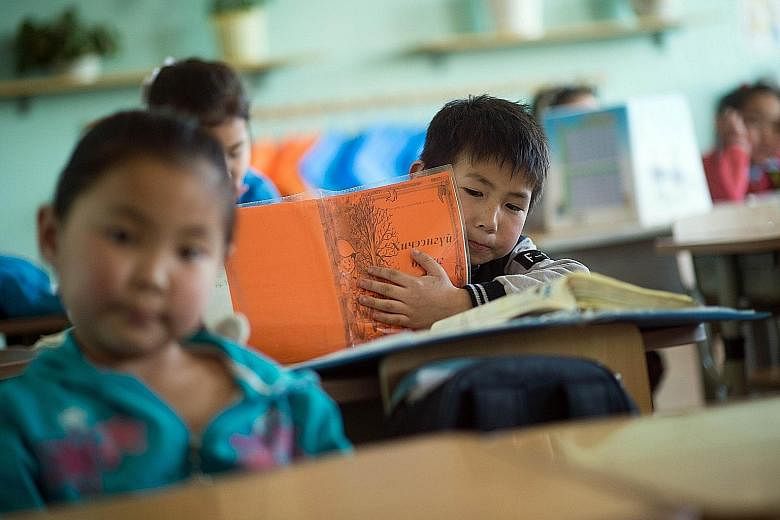ALTANBULAG (Mongolia) • For more than 50 years, children on the windswept steppes of Mongolia have studied in a school built by a surprising benefactor: Isolated, impoverished, often implacable North Korea.
An image of the North's founder, Kim Il Sung, hangs in a classroom in the yellow two-storey building, symbolising a time when the countries marched in lockstep as communist cogs in the machinery of Cold War confrontation. Now they move to starkly different rhythms.
Mongolia rode the wave of revolution that swept across Eastern Europe in 1989 and has become a vibrant democracy. But North Korea has doubled down into monolithic, nuclear-armed isolation.
But the ties of the past endure, as evidenced by continuing North Korean attention to the school - and a quiet diplomatic channel between Ulan Bator and Pyongyang.
The school has around 300 pupils aged six to 18, some of them boarders who stay in a dormitory while their nomadic parents herd sheep and other livestock on the steppes.
Mr Deshigiin Chuluunbat, the principal, says its 1961 construction had its origins in the Korean War of the previous decade, when Mongolia sent horses and food as aid to Pyongyang and also took in North Korean orphans.
"North Korea reciprocated that help and built this school," he said at the facility in Altanbulag, Tov province.
Even now, North Korean visitors come every year. Pyongyang renovated a physics classroom in 2012 - the centenary of Kim's birth - installing two plaques above the door emblazoned with his name in Korean and Mongolian, as well as his portrait over the blackboard.
Mongolia's government acts as an intermediary in global efforts to engage North Korea.
As part of what is known as the Ulaanbaatar Dialogue, Mongolia has hosted negotiations between diplomats from Tokyo and Pyongyang over the issue of Japanese kidnapped by North Korea to train its spies. It hosted a reunion in March last year between the parents of abductee Megumi Yokota - seized as a 13-year-old in 1977, and whose fate remains unclear - and her North Korea-born daughter.
"Mongolia is uniquely positioned as the only country in North-east Asia that enjoys good relations not only with North Korea, but also South Korea, the United States, China, Russia and Japan," Brookings Institution scholars wrote in a paper.
Even so Mongolia has not shied away from blunt speaking.
President Tsakhiagiin Elbegdorj, who as a student leader played a key role in the country's democratic transition, visited North Korea in 2013 and extolled the benefits of freedom at Pyongyang's Kim Il Sung University, saying in a speech: "No tyranny lasts forever."
Dr John Delury, an expert on China and North-east Asia at Yonsei University in Seoul, applauded Ulan Bator's efforts.
"The platform that Mongolia provides is incredibly valuable because the United States government hardly talks to North Korea at all and you need some dialogue to have some basis for understanding where positions are," he said.
But he also noted that Mr Elbegdorj did not meet North Korean leader Kim Jong Un, indicating the limits of this channel.
Such geopolitical intricacies pass over Altanbulag. The village is 50km from Ulan Bator but feels a world away from the capital.
American Andrew Guarino was a volunteer English teacher there for two years. One day in 2012, he was summoned to find numerous official vehicles and men in dark suits with Kim Il Sung badges.
During a solemn ceremony marking the renovation of a classroom, the visitors clapped in unison, "never off beat", and bowed before repeating the sequence, all with military-like precision.
"It was pretty surreal," he said.
AGENCE FRANCE-PRESSE

